
Quetes Litteraires
Scope & Guideline
Advancing Scholarly Dialogue in Literary Realms
Introduction
Aims and Scopes
- Ludic Literature and Playfulness:
A core focus on the concept of play in literature, examining how games, role-playing, and ludic elements influence narrative structures and thematic development in literary texts. - Memory and Autobiographical Narratives:
An emphasis on memory, particularly how it is constructed, represented, and manipulated in autobiographical and narrative forms, reflecting on the interplay between personal and collective histories. - Intertextuality and Literary Forms:
Investigation of intertextual relationships and the evolution of literary forms over time, considering how authors reference and reshape existing texts to create new meanings. - Cultural and Historical Contexts:
Analysis of literature within its cultural and historical contexts, exploring how societal changes influence literary themes and styles, particularly in French literature. - Thematic Variations in Utopian and Dystopian Narratives:
A unique contribution through the exploration of utopian and dystopian themes, examining how these constructs reflect societal hopes and fears throughout literary history.
Trending and Emerging
- Exploration of Postmemory and Trauma:
An increased focus on postmemory and trauma narratives reflects a growing interest in how literature responds to historical events and personal histories, resonating with current global conversations around memory and identity. - Ludic and Interactive Narratives:
Emerging trends highlight the significance of ludic elements in narrative construction, showcasing how contemporary authors utilize games and playful structures to engage readers in new ways. - Feminist and Gender Studies Perspectives:
A notable rise in the examination of gendered perspectives within literary texts, particularly in relation to memory and identity, signaling an expanding discourse on feminist literary criticism. - Multimodal and Interdisciplinary Approaches:
The integration of interdisciplinary methods, including visual and performative aspects of texts, indicates a trend towards a more holistic understanding of literature and its impact on various forms of expression.
Declining or Waning
- Traditional Utopian Ideals:
While utopian narratives are still explored, the focus on traditional, idealized visions of utopia is waning, perhaps in favor of more nuanced or critical examinations of utopianism and its failures. - Historical Literary Figures:
There seems to be a reduction in the emphasis on classical literary figures and their works, as contemporary themes and modern authors gain more attention in current discourse. - Static Literary Critique:
A decline in static or purely formalist critiques that do not engage with broader cultural or social implications of literary texts, indicating a shift towards more dynamic, interdisciplinary approaches.
Similar Journals

Studia Austriaca
Unveiling the Rich Tapestry of Austrian Literary HeritageStudia Austriaca, published by Milano University Press, is a distinguished open-access journal that has been promoting scholarly discourse in the realms of Cultural Studies and Literature since its inception in 1992. Based in Italy, this journal aims to serve as a vital platform for researchers, professionals, and students seeking to explore the complexities of Austrian culture and its literary contributions. With ISSN 1593-2508 for print and E-ISSN 2385-2925 for online access, Studia Austriaca offers a comprehensive repository of articles that reflect a dynamic understanding of cultural interactions. Although its current Scopus rankings place it in the lower percentiles of the Arts and Humanities categories, the journal's commitment to maintaining high academic standards and facilitating open access ensures that it remains an essential reference for academic inquiry. The journal's coverage is set to continue evolving, with converged years extending from 2017 to 2024, thus paving the way for emerging discussions and research developments in the fields of literature and cultural studies.

CRITICA LETTERARIA
Illuminating Diverse Literary Analyses and TheoriesCRITICA LETTERARIA is an esteemed literary journal published by Paolo Loffredo Iniziative Editoriali SRL that has been contributing to discussions in the field of literature and literary theory since its inception in 2009. With an ISSN of 0390-0142 and an E-ISSN of 2035-2638, this journal is indexed in Scopus, ranking in the category of Arts and Humanities under Literature and Literary Theory. It is classified in the Q4 quartile, indicating its dedication to serving a niche yet vital discourse within the broader literary community. Although currently not open access, the journal offers a platform for scholars, researchers, and students to engage with diverse literary analyses and theoretical advancements. Located in the vibrant city of Naples, Italy, CRITICA LETTERARIA aims to foster academic dialogue and promote innovative approaches in literary studies, making it an important resource for anyone passionate about navigating the complexities of literary narratives and theory.

Acta Literaria
Bridging Ideas in the Realm of Humanities and ArtActa Literaria is a distinguished journal published by the Universidad de Concepción, Facultad de Humanidades y Arte, focusing on the intricate domains of literature and literary theory. With an ISSN of 0717-6848, this Chilean journal has been a vital contributor to the scholarly discourse in its field since its inception in 2007. Although currently categorized in the Q4 quartile for the year 2023 and holding a Scopus rank of #860 out of 1106 in the Arts and Humanities section, Acta Literaria plays a crucial role in fostering dialogue and exploration among researchers, professionals, and students alike. The journal aims to facilitate the exchange of innovative ideas, critical analyses, and diverse perspectives on literature, making it an indispensable resource for anyone engaged in literary studies. While it does not offer open access, the journal's commitment to upholding academic rigor ensures that it remains a respected platform for scholarly publication.
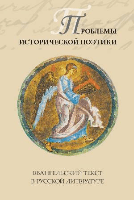
Problemy Istoricheskoi Poetiki
Empowering Scholars with Open Access KnowledgeProblemy Istoricheskoi Poetiki is a leading academic journal in the field of Literature and Literary Theory, published by PETROZAVODSK STATE UNIVERSITY since 1990. With an impact factor that places it in the Q1 category for 2023, this journal is distinguished for its scholarly contributions, ranked #169 out of 1106 in the Scopus Arts and Humanities category, which positions it in the 84th percentile. Focused on advancing the understanding of historical poetics, the journal encourages rigorous research and offers Open Access to its published works, ensuring the dissemination of knowledge across borders, while fostering collaboration among scholars globally. The editorial board is committed to publishing innovative and insightful articles that address crucial themes in literary history, theory, and interpretation, making it an essential resource for researchers, professionals, and students alike. The journal's harmonious convergence of traditional literary studies with contemporary analytical approaches makes it a vital platform for exploring the dynamics of literature within its historical contexts.
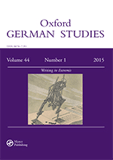
OXFORD GERMAN STUDIES
Advancing Knowledge in the Heart of German StudiesOXFORD GERMAN STUDIES, published by Routledge Journals, Taylor & Francis Ltd, is an esteemed academic journal dedicated to the exploration and scholarly examination of German literature and linguistics. With an ISSN of 0078-7191 and E-ISSN of 1745-9214, this journal has been in circulation since 1966, offering researchers a unique platform for critical discourse, innovative research, and interdisciplinary dialogue. It holds a significant position in the academic landscape, being categorized in the Q4 quartile for Linguistics and Language and Q3 for Literature and Literary Theory as of 2023. Despite lacking open-access options, the journal thrives in providing invaluable insights, aiming to bridge historical contexts with contemporary perspectives on German studies. It serves as an essential resource for scholars, professionals, and students eager to deepen their understanding of Germanic languages and literature. Located in Abingdon, United Kingdom, the journal continues to uphold its mission of advancing knowledge and fostering scholarly discussions in the rich field of German studies.

CESKA LITERATURA
Navigating the Landscape of Czech Literary StudiesCESKA LITERATURA is a prestigious peer-reviewed journal dedicated to the exploration and analysis of Czech literature and its role within the broader spectrum of literary theory. Published by the Czech Academy of Sciences, Institute of Czech Literature, this journal has established itself as a vital resource for scholars and practitioners in the field since its inception. With an impact factor that reflects its influence, CESKA LITERATURA provides open access content since 2021, ensuring wider dissemination and accessibility of research findings. The journal aims to foster interdisciplinary dialogue and engage with contemporary literary discourse while covering a range of topics from historical studies to modern literary critiques. With a proud heritage from 2002 to 2024, CESKA LITERATURA holds a notable position, categorized in the Q3 quartile in Literature and Literary Theory for 2023, and ranked #458 out of 1106 in the Scopus database, highlighting its relevance and contribution to the arts and humanities domain. Scholars and students interested in deepening their understanding of Czech literature and contributing to its ongoing discussion are encouraged to explore the rich array of articles and insights available in this important publication.
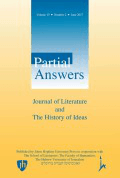
Partial Answers-Journal of Literature and the History of Ideas
Exploring the Intersections of Literature and ThoughtPartial Answers - Journal of Literature and the History of Ideas, published by the esteemed Johns Hopkins University Press, is a vital academic resource for scholars interested in the dynamic intersections of literature, philosophy, and cultural studies. With an established track record since its inception in 2003, this journal fosters rigorous dialogue and exploration across disciplines, offering a comprehensive platform for innovative research and critical thought. Highlighted by its 2023 Scopus rankings, it holds positions within the Q2 and Q3 quartiles, indicating a significant impact in its respective fields—specifically in Literature and Literary Theory, and Cultural Studies. Readers can expect cutting-edge articles that challenge conventional wisdom and probe the historical contexts of literary works. Although the journal is not Open Access, it remains committed to the dissemination of scholarly knowledge, making it a cornerstone for researchers, professionals, and students seeking to deepen their understanding of literature's role in shaping ideas. With its diverse contributions and thematic depth, Partial Answers is essential for anyone engaged in the nuanced study of literary narratives and philosophical inquiries.
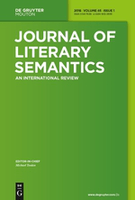
JOURNAL OF LITERARY SEMANTICS
Decoding the Language of Literature with PrecisionJOURNAL OF LITERARY SEMANTICS, published by De Gruyter Mouton, stands as a prestigious platform for interdisciplinary scholarship at the intersection of linguistics and literature, with a focus on the intricate ways meaning is constructed and understood within texts. With a notable Q2 ranking in Linguistics and Language and an impressive Q1 ranking in Literature and Literary Theory as per the 2023 category quartiles, this journal promises to contribute significantly to both fields. The journal's rigorous peer-review process and commitment to high academic standards ensure that only the most impactful and innovative research is featured, solidifying its rank as #83 out of 1106 in Literature and Literary Theory according to Scopus. Since its inception in 1972, the journal has evolved to address contemporary issues in literary semantics, making it an essential resource for researchers, educators, and students striving to deepen their understanding of language in literature. The ISSN for the print version is 0341-7638, with the electronic version designated as 1613-3838, and while it is not an open access journal, its contributions remain crucial for advancing scholarly discourse.
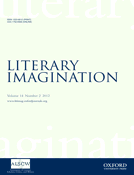
Literary Imagination
Exploring the Depths of Literary CreativityLiterary Imagination, published by Oxford University Press, is an esteemed journal that delves into the intricate world of literature and literary theory. With the ISSN 1523-9012 and the E-ISSN 1752-6566, this journal serves as a pivotal platform for scholars and practitioners in the field, striving to advance the understanding of imaginative literature from various critical perspectives. Boasting a 2023 rank of #751 out of 1106 in the Arts and Humanities category on Scopus, and categorized in the Q3 quartile for literature and literary theory, the journal is recognized for its contribution to the academic discourse. It aims to foster a vibrant academic community through the publication of innovative research, critical essays, and interdisciplinary studies that engage with the complexities of literary creation from 2009 to 2024. While currently not an open access journal, its rich repository of scholarly work remains accessible to researchers, professionals, and students aiming to enrich their understanding of literary narratives and their theoretical frameworks.

STAND
Illuminating Literary Criticism and TheorySTAND is a distinguished academic journal dedicated to the critical analysis and exploration of literature and literary theory, published by the reputable STAND collective. With a history of publication spanning from 2002 to 2017, this journal offers an invaluable platform for scholars, researchers, and students engaged in the arts and humanities. Although coverage has been discontinued in Scopus, the journal has maintained a notable rank of #620 out of 793 in its category, placing it in the 21st percentile among its peers. STAND seeks to foster scholarly discourse, presenting articles that push the boundaries of literary criticism and theory, enriching the academic landscape of literature studies. While it operates under a traditional access model, it remains a vital resource for those looking to deepen their understanding of literary practices and critical methodologies, with contributions from influential voices in the field.